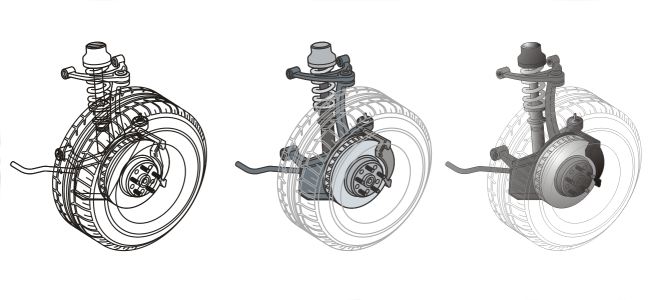Viewing modes
As you work, Corel DESIGNER lets you display a drawing in any of the following modes:
•
Wireframe — displays an outline of the drawing by hiding
fills,
extrusions,
contours, and
drop shadows; also displays the bitmaps in monochrome. This mode lets you quickly preview basic elements in a drawing.
•
Normal — displays a drawing without
PostScript fills or high-resolution bitmaps. This mode refreshes and opens slightly faster than the Enhanced mode.
•
Enhanced — displays a drawing with PostScript fills, high-resolution bitmaps, and
anti-aliased vector graphics.
•
Pixels — displays a pixel-based rendition of the drawing, which allows you to zoom in on an area of an object, and then position and size the object more precisely. This view also lets you see what the drawing will look like when it is exported to a bitmap file format.
•
Simulate overprints — simulates the color of areas where overlapping objects were set to overprint and displays PostScript fills, high-resolution bitmaps, and
anti-aliased vector graphics. For information about overprinting objects, see
To overprint selected color separations.•
Rasterize complex effects — rasterizes the display of complex effects, such as transparencies, bevels, and drop shadows when in Enhanced view. This option is useful for previewing how the complex effects will be printed. To ensure the successful printing of complex effects, most printers require complex effects to be rasterized.
The viewing mode you choose affects the amount of time it takes for a drawing to open or be displayed on the monitor. For example, a drawing displayed in Wireframe view takes less time to refresh or open than does a drawing displayed in Simulate Overprints view.
Left to right: Wireframe, Draft, and Enhanced views
To choose a viewing mode

•
Click
View, and click one of the following modes:
•
Rasterize complex effects

If you are overprinting, it is important to preview the objects in the Simulate overprints mode before printing. The type of objects you are overprinting and the type of colors you are mixing determine how overprinted colors are combined. For more information about overprinting, see Color trapping and overprinting.
To set the default viewing mode, click Layout  Document Options, click General, and choose an option from the View mode list box.
Document Options, click General, and choose an option from the View mode list box.

You can quickly switch between the selected viewing mode and the previous viewing mode by pressing Shift + F9.
![]() Document Options, click General, and choose an option from the View mode list box.
Document Options, click General, and choose an option from the View mode list box.